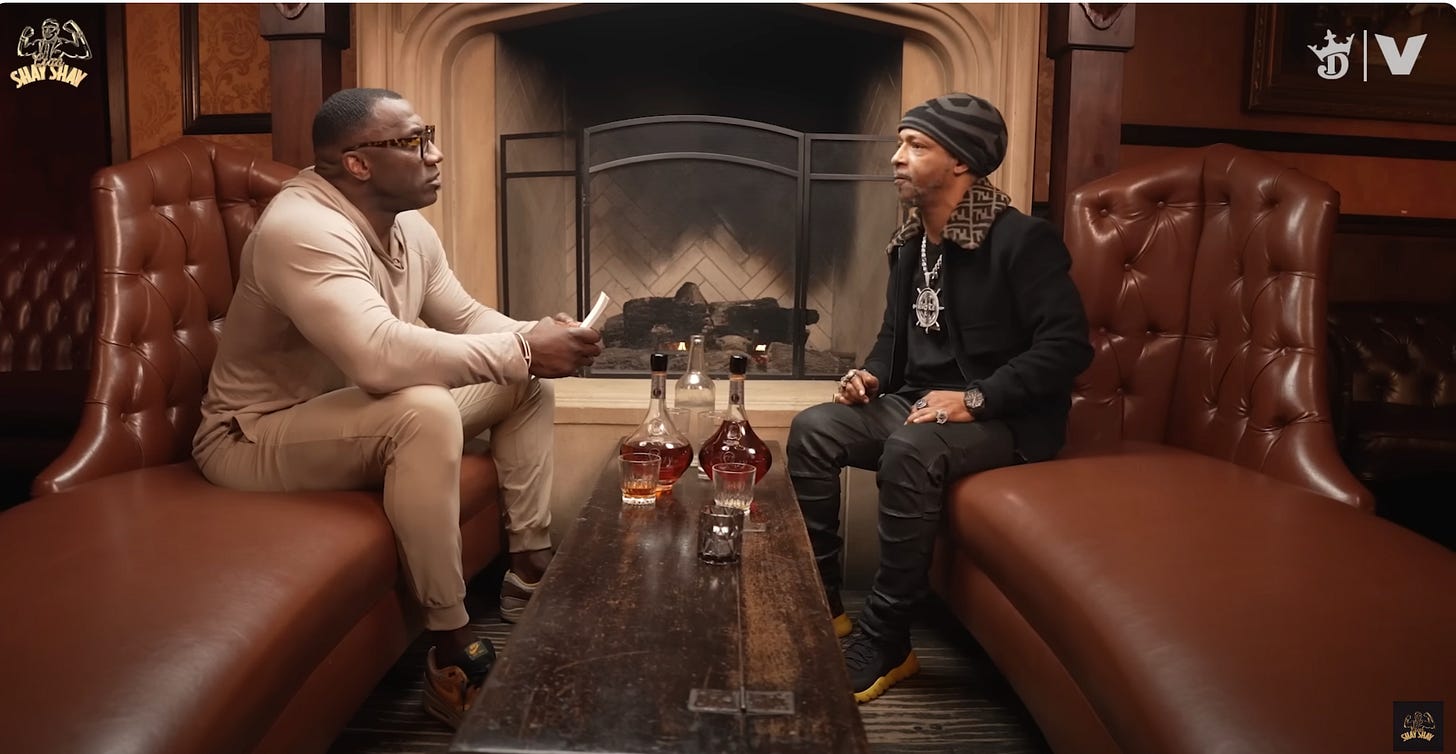
I had a different post about New Year’s resolutions scheduled for today, which will be bumped to next week. I have to talk about Katt William’s interview with Shannon Sharpe because there’s a lot to unpack. Despite the interview being entertaining to watch and a great distraction while folding my laundry, too many issues popped up for me to ignore or let slide.
Yesterday, former NFL tight end Shannon Sharpe’s comportment and role during the interview and how Williams speaks about his comedic craft. Williams’s devotion to comedy verges on obsessive at many points. While all artists, writers, and entertainers should take their craft seriously and respect the form, moralizing craft, and formal choices can be restrictive and lead to stagnancy.
Watching Williams’s outrage felt cathartic. Listening to a malcontent entertainer air grievances and “behind the scenes” information can make a viewer feel like they’re in on the secret and inspire indignation and allegiance to the speaker in a way that can distract from other emotions, signals, or information. However, I am always wary when someone manipulates my emotions to serve their narrative. Williams says multiple times that he’s a prodigy with genius-level intellect, so attempts to gaslight Sharpe, manage the interview, and inspire outrage sent alarms, which only grew after each time he mentioned how wealthy he is.
To be fair, Sharpe lost control of that interview and let Williams say whatever. Most of the interview revolves around Williams calling his peers “lazy” and “bums” for allegedly stealing jokes, using writers, and “taking shortcuts.” These statements, while salacious, seemed standard in the industry where stories and authenticity are currency. However, the interview turns from critiquing their work ethic to critiquing their integrity and suggesting sexual misconduct took place with frequent mentions of his unpenetrated anus.
Whether for rage bait clicks or lack of interviewing and reporting experience, Sharpe failed to press Williams about comments regarding sexual misconduct, missing various opportunities to ask follow-up or clarifying questions that would have required the entertainer to state his opinions and allegations clearly versus hiding behind rhetorical gymnastics. “The Chris Tucker we have now is Epstein Island Tucker, not Smokey.” This line, followed by insinuations about Tuckers’ friendship with Michael Jackson, prompts viewers to fill in the blanks about what connects Jeffery Epstein to Michael Jackson. While Epstein did bring Tucker to the island where Epstein engaged in sex trafficking, Tucker has yet to respond to this leaked information and was not charged by the government at the moment. Allowing Williams to speak flippantly without proof and failing to clarify that those opinions belonged to Williams alone could inspire legal action.
However, hearing that Williams grew up an Evangelical Christian (Jehovah’s Witness) contextualizes these moments and later segments. British sociologist Andrew Holden, author of Jehovah’s Witness: Portrait of a Contemporary Religious Movement, writes that JW practitioners are under constant surveillance. Other researchers and former JW members also note that the organization discourages independent thinking, encouraging blind devotion. Pew Research Center research found that JWs tend to be socially and politically conservative. An analysis of Evangelical Christian culture in The New Yorker suggests that practitioners tend to believe conspiracy theories. Even though Williams left his family at 13, I wonder how this upbringing affected his devotion to craft and his thoughts about integrity and judgment.
When Williams talks about the gatekeepers who only allow their chosen few to say certain things, he uses vague and unspecific language. Williams’ vague insinuations about gatekeepers in Hollywood and his peers taking shortcuts sound remarkably different from Williams’s clearly accusing Cedric of stealing a specific joke at one time. Kevin Hart possibly building a career playing caricatures of Black people, an arguable point, does not necessarily mean he was planted by the powers that be.
Williams’s views on the craft of comedy and writing also caused me some alarm as a writer. His narrative about his comedy journey felt sanctimonious. There is no singular, morally correct way to become a writer or artist; each journey is individual and has its challenges. I am also not convinced that joke stealing equals plagiarism, as Williams or other comedians sometimes suggest. If you make the material your own so that it does not resemble another artist, isn’t taking that initial concept just inspiration?
Personally, I don’t want to be in an arts and entertainment ecosystem where my writing journey and career choices are surveilled the way Williams judged his peers in this interview. If Williams is as good as he says, why can’t he let his path be his and their journey and sacrifices be theirs?




